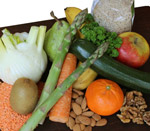|
|

An excellent assessment of a new paper in Food & Chemical Toxicity on the Allergy Insight blog. How safe is gluten based beer which has been treated with enzymes to degrade the gluten fragments? Can tests designed for solid foods really be valid for liquids such as beer? Read on. |

Dr Rebecca Knibb and her team at Aston University are looking for participants for their survey designed to under stand the quality of life, anxiety and self efficacy of adults with food allergy. Understanding the role that self efficacy has in food allergy management will help them develop interventions to help adults manage their allergies. Your insights could provide vital information concerning the issues surrounding managing food allergies as an adult. For more information and to sign up. |

The huge growth in the number of vegan products on the market should be a massive bonus for those with milk or egg allergies. But – so many of them come with PAL/May Contain warnings for milk and egg, that it has also been a cause of great frustration and no small degree of acrimony. Vegans and the allergy community are coming from very different places. And then there is the food industry – with a whole different set of priorities – and the regulators/enforcers who have to police the territory. At a very interesting seminar organised by the Chartered Trading Standards Institute it soon became clear that there are basically four players involved. Read on... |

The Specific Carbohydrate Diet was created in 1924 by a US pediatrician Sydney Valentine Haas (1870-1964). He used the diet (affectionately known as the banana diet) to help children with failure to thrive, protein malnutrition associated with celiac disease, and inflammatory bowel disease. It was subsequently developed, with guidelines and recipes by Elaine Gottschall in her 1987 book Breaking the Vicious Cycle: Intestinal Health Through Diet. In an interesting article in this month's Townsend Letter, Christine Bowen decribes how it resolved her lifelong intestinal issues, the research that has subsequently been done to validate Dr Haas' theories and the success she has had with her own patients on the diet. |

Could the unprecedented 8-fold rise in horse deaths at Churchill Downs, home of the Kentucky Derby, in May and June this year be connected to the wireless devices fitted on April 29th to all horses racing there? Arthur Firstenberg and the Cellphone Task Force suggests that they could. Read on. |
|



















